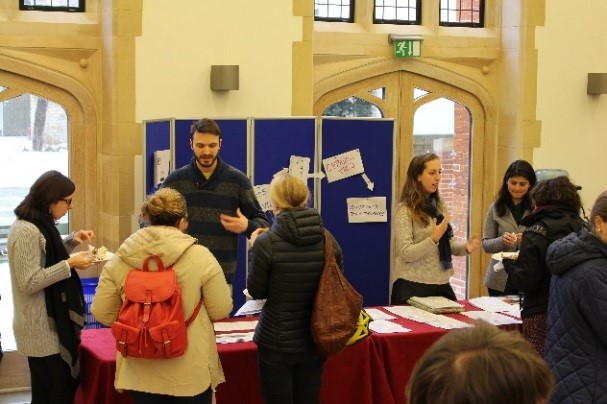Research Methods
 Our first-year programme in this core training strand aims to enhance students’ awareness and understanding of the primary research methods and approaches used by their peers across the many different academic fields involved in the DTP. It begins with a session on techniques for conducting detailed analysis, offering students a taste of methodologies which are prevalent in other fields, allowing them to discuss approaches in their own domain, and giving them with an opportunity to practise explaining those approaches to academic non-specialists in anticipation of undergraduate teaching. Subsequently, we organise a ‘Question Time’-style debate between senior colleagues on the uses and abuses of theory, and a ‘theories fair’ at which early career researchers and advanced PhD students present current theoretical developments for the first year students. A third session covers practice-led research in different disciplines, highlighting a range of approaches which are less well-represented, but growing in importance in Cambridge and elsewhere.
Our first-year programme in this core training strand aims to enhance students’ awareness and understanding of the primary research methods and approaches used by their peers across the many different academic fields involved in the DTP. It begins with a session on techniques for conducting detailed analysis, offering students a taste of methodologies which are prevalent in other fields, allowing them to discuss approaches in their own domain, and giving them with an opportunity to practise explaining those approaches to academic non-specialists in anticipation of undergraduate teaching. Subsequently, we organise a ‘Question Time’-style debate between senior colleagues on the uses and abuses of theory, and a ‘theories fair’ at which early career researchers and advanced PhD students present current theoretical developments for the first year students. A third session covers practice-led research in different disciplines, highlighting a range of approaches which are less well-represented, but growing in importance in Cambridge and elsewhere.
For second years, a Lent Term session on the relationship between the humanities and digital methods, including big data, continues the exploration of primary approaches to research. Otherwise, though, this year sees a shift in focus towards methodological issues which can affect the way all researchers operate, irrespective of discipline. In the Michaelmas Term, a workshop considers how different approaches to framing research questions can unlock continued academic funding at different career stages and encourages students to practise presenting their own research questions to peers in other fields. The Easter Term workshop, meanwhile, introduces students to the impact agenda, and considers how evidencing impact can affect the way in which research is carried out.
The third-year sessions continue the emphasis on methodological concerns which can enhance the professionalism of all academics, with an eye to issues which are more relevant to students in the latter stages of their doctorate, as they write up, rewrite or edit their thesis, and involve themselves increasingly in prestigious conferences or publications. Thus a session investigating different approaches to marshalling data and evidence through argumentation in a drive towards proof is followed by a workshop on ways of managing academic disagreement respectfully.
